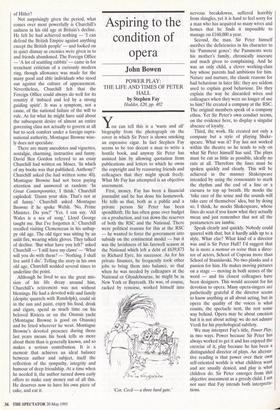Aspiring to the condition of opera
John Bowen
POWER PLAY: THE LIFE AND TIMES OF PETER HALL by Stephen Fay Hodder, £20, pp. 402 You can tell this is a 'warts and all' biography from the photograph on the cover in which Sir Peter is shown smoking an expensive cigar. In fact Stephen Fay seems to be too decent a man to write a hostile book, and anyway Sir Peter has assisted him by allowing quotation from publications and letters to which he owns the copyright and by reassuring friends and colleagues that they might speak freely. What Mr Fay has attempted is an objective assessment.
First, money. Fay has been a financial journalist and he has done his homework. He tells us that, both as a public and a private person Sir Peter has been spendthrift. He has often gone over budget on a production, and ran down the reserves of both the RSC and the National. There were political reasons for this at the RSC — he wanted to force the government into subsidy on the continental model — but it was the lavishness of his farewell season at the National which left a debt of £639,873 to Richard Eyre, his successor. As for his private finances, he frequently took other jobs to bring them into balance, so that when he was needed by colleagues at the National or Glyndebourne, he might be in New York or Bayreuth. He was, of course, racked by remorse, worked himself into 'Cor, Cecil — a three bard gate.' nervous breakdowns, suffered horribly from shingles, yet it is hard to feel sorry for a man who has acquired so many wives and homes that he finds it impossible to manage on £160,000 a year.
Second, the man. Sir Peter himself ascribes the deficiencies in his character to his 'Pamment genes': the Pamments were his mother's family, chronically insecure and much given to complaining. And he was an only child, a clever working-class boy whose parents had ambitions for him. Nature and nurture, the classic reasons for bad behaviour in later life: they are seldom used to explain good behaviour. Do they explain the way he discarded wives and colleagues when they were no longer of use to him? He created a company at the RSC. The original members speak of a company ethos. Yet Sir Peter's own conduct seems, on the evidence here, to display a singular absence of loyalty.
Third, the work. He created not only a company but a style of playing Shake- speare. What was it? Fay has not worked within the theatre so he tends to rely on what Sir Peter himself has said. The plays must be cut as little as possible, ideally no cuts at all. Therefore the lines must be spoken quickly and clearly. This will be achieved in the manner Shakespeare intended by using the consonants to mark the rhythm and the end of a line or a caesura to top up breath. He mocks the 'take care of the sense and the sounds will take care of themselves' idea, but by doing so, I think, he mocks Shakespeare, whose lines do scan if you know what they actually mean and just remember that not all the pentameters are iambic.
Speak clearly and quickly. Nobody could quarrel with that, but it hardly adds up to a style. What else? What kind of a director was and is Sir Peter Hall? I'd suggest that he is more a metteur en scene than a direc- tor of actors, School of Copeau more than School of Stanislayski. No two planks and a passion for him. He makes moving pictures on a stage — moving in both senses of the word — and his closest colleagues have been designers. This would account for his devotion to opera. Many opera-singers are pathetically grateful if the director seems to know anything at all about acting, but in opera the quality of the voices is what counts, the spectacle next, the rest some way behind. Opera may be about emotion but it is not about acting: we do not admire Verdi for his psychological subtlety.
We may interpret Fay's title, Power Play, in two ways. Power because Sir Peter has always worked to get it and has enjoyed the exercise of it, play because he has been a distinguished director of plays. An alterna- tive reading is that power over their own self-oriented worlds is what children want and are usually denied, and play is what children do. Sir Peter emerges from this objective assessment as a greedy child. I am not sure that Fay intends both interpreta- tions.


































































 Previous page
Previous page